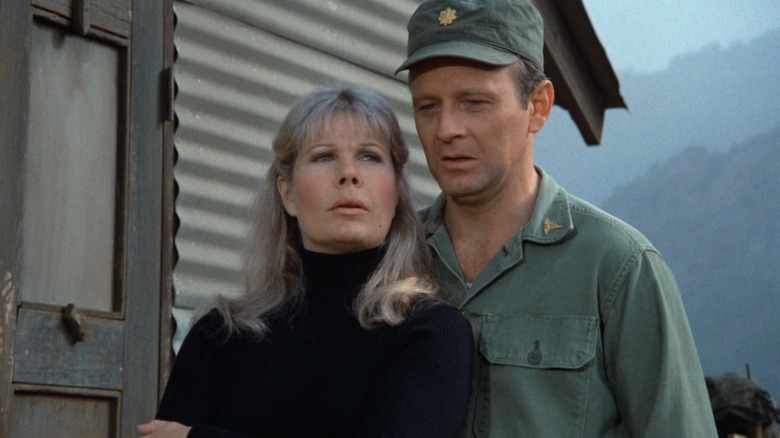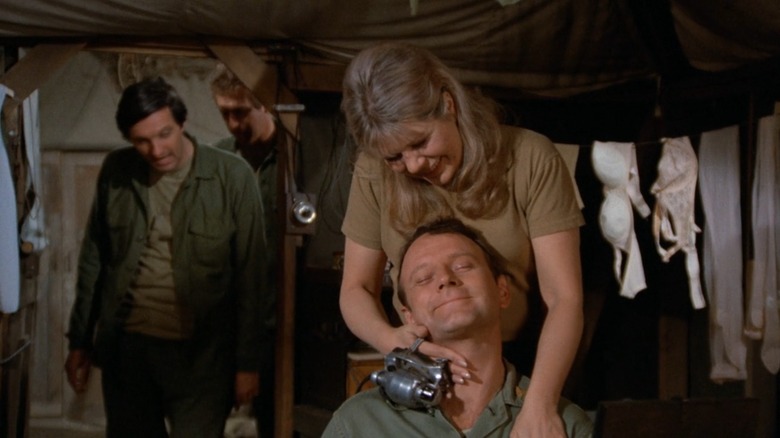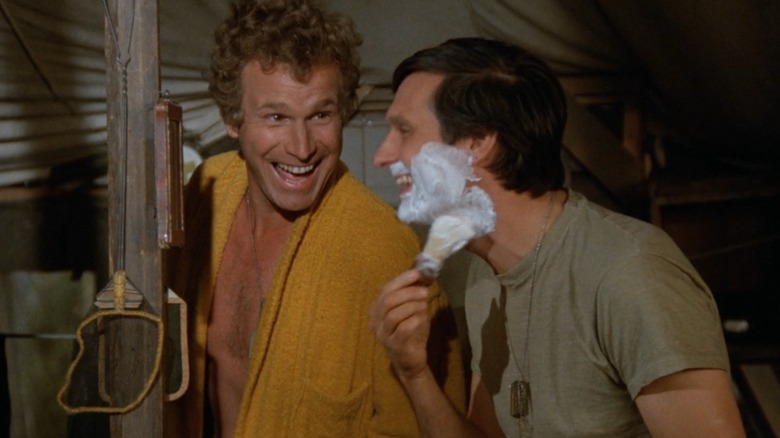CBS Censors Somehow Overlooked Two Of The Dirtiest Lines In M*A*S*H
"M*A*S*H" is often remembered these days for its heartfelt progressivism and genre-blending drama, but when it wasn't making us think or bringing us to tears, the long-running sitcom had viewers doubled over in stitches. A bawdy comedy from day one, "M*A*S*H" was often able to interject wild, unexpected jokes into its fast-paced episodes thanks in part to star Alan Alda's knack for nimble verbal comedy. His character, surgeon Hawkeye Pierce, started the series as a motor-mouthed womanizer with a knack for disarming everyone around him with his charming (and exhausting) teasing sensibilities.
Since "M*A*S*H" was largely filmed in the 1970s but set in the '50s, its humor often felt even edgier than it was. It was easy to forget the jokes were coming from the mouths of actors who'd already witnessed the free love movement and a move away from the starch shirts, pleated dresses, and idyllic TV worlds of shows like "Leave it to Beaver." In the context of either decade, though, some of the jokes that "M*A*S*H" got past CBS censors were particularly dirty, including two that series creator Larry Gelbart still remembered decades after the series ended.
The surprising sex toy joke that made it into M*A*S*H
In a conversation with Ed Solomonson for Solomonson and Mark O'Neill's 2009 book "TV's 'M*A*S*H': The Ultimate Guidebook," Gelbart spoke about a couple of especially bodily references that somehow made it past network censors. The first took place in the season 2 episode "The Trial of Henry Blake," in which camp brown-noser Frank Burns (Larry Linville) and head nurse Margaret Houlihan (Loretta Swit, whose character would evolve later but at that point was mostly just a snob) decided to formally charge Colonel Blake (McLean Stevenson) over his incompetent leadership. The episode's script credit went to Stevenson himself, and the actor (or one of his fellow writers) managed to sneak in a jaw dropping reference to sex toys.
The moment comes when Hawkeye walks in on Margaret using an electronic neck massager on Frank, who the whole camp knew she was having a steamy affair with. "Behind every great man, there is a woman with a vibrator," Hawkeye jokes, a double entendre that depending on which way you tilt your head gestures toward the idea of a woman's solo (and secret) sexual exploits, or to the then even more taboo idea of a prostate stimulation. Either way, the joke was apparently intentional. "Probably the poor schmuck who was the censor didn't know what people did with a vibrator," Gelbart told Solomonson with a laugh when the writer brought up the joke during a 2004 interview. "He may have thought we were talking about a foot vibrator," Gelbart concluded. After he makes the comment, Hawkeye and Trapper (Wayne Rogers) salute, just so Margaret will do the same — and accidentally hold up the bulky metal massager in the process.
Frank's snug harbor and other double entendres
Gelbart indicated that he was surprised when the show got away with that joke, as well as another naughty Margaret and Frank bit that Solomonson brought to his attention during their conversation. In the season 1 episode "Tuttle," Frank gives Margaret an awkwardly intimate compliment, saying, "Oh, Margaret. You're my snug harbor. I don't know what I'd do if I didn't have you to sail into." That one's pretty self-explanatory, and Gelbart says it probably got through because censors were much more focused on curse words than wordplay. "I don't know why they allowed that," he said. "I guess they were too busy looking for 'Hells' and 'Damns.'" According to the series creator, the censorship team was typically "only looking for single entendres."
There are plenty of other surprisingly edgy-for-the-seventies jokes that made it onto "M*A*S*H" across its 11 seasons, including dozens from Hawkeye that came across as blatantly bisexual flirtations. According to Gelbart, though, the network mostly kept out of writers' hair after it was clear that "M*A*S*H" was a massive hit. "Certainly, after the first year, after the show took off because they put it in a place where it would attract ratings, they didn't say a whole lot about the show, in general," he recalled in 2004. "They had censorship comments on every script, but they pretty much let us alone because they didn't know what we were doing — and whatever we were doing, it was getting them ratings."
Over its historic decade-plus run, the show was clever enough and charming enough to pull off some truly radical jokes — including a few that still leave fans laughing in surprise at the writers' daring today.


